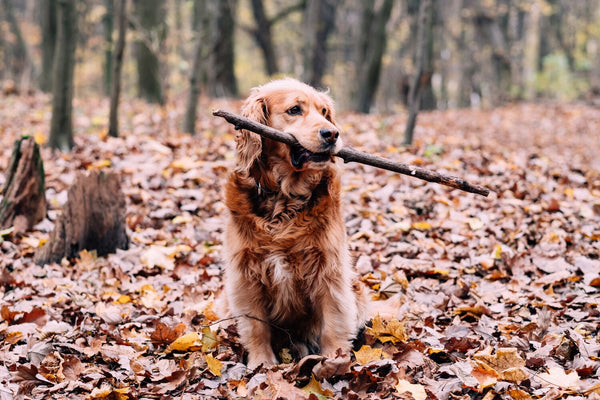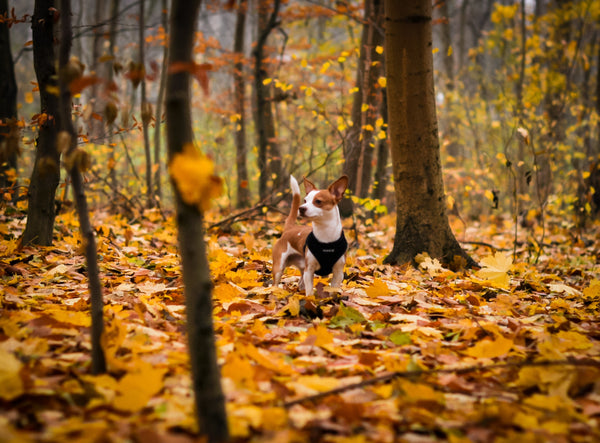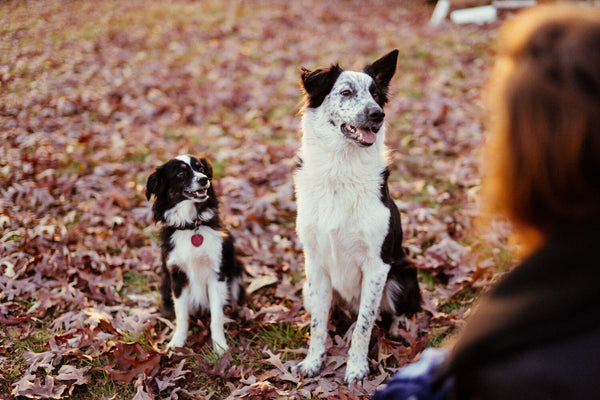If you’re a pet parent, it’s wise to be aware of fall allergies that can affect your four-legged family member. As the weather shifts and plants release pollen into the air, your pup may start to experience uncomfortable symptoms due to seasonal pet allergies—just like us humans!
In this article, we’ll go through common dog allergens so you can better recognize the signs if your pup is feeling under the weather.
Why do dogs become more allergic in the fall?
The reason why many dogs experience allergies in the fall is that there are more pollens and molds in the air. These irritants can easily find their way into your pup’s system when they inhale them, which causes allergic reactions like sneezing and itching.
What can I do to help?
If you suspect that your dog may have seasonal allergies, it’s best to avoid walking him or her during peak pollen times (usually early morning and evening). This helps limit exposure to allergens for both your dog and yourself.
Also, brushing your dog regularly helps keep loose fur from becoming a breeding ground for allergens and bacteria on the coat. Finally, following a strict bathing routine with specially fortified shampoos to remove allergens from your pup’s coat and skin can also help combat allergic reactions.

What causes allergies in dogs?
Allergies in dogs, much like those affecting humans, are caused by an immune system response to the presence of an allergen. The immune system then mistakes harmless substances, such as dust mites, pollen, or mold spores, for harmful invaders. This triggers the release of antibodies that cause inflammation and allergic reactions in dogs.
Types of Common Dog Allergens in the Fall
Pollen
It's not just humans who suffer when the weather turns warm and the flowers start blooming - our canine friends can have allergies, too.
Pollen is one of the most common fall allergies that affect dogs; it can cause itchy skin, sneezing, coughing, rashes, or even asthma-like symptoms in some cases. If left untreated, pollen allergies can lead to secondary infections due to excessive scratching and licking by your pet.
Mold
Another common allergen in the fall is mold. Mold spores grow on wet surfaces and can be found outdoors as well as indoors. When exposed to mold spores, your dog may experience irritation of the skin or respiratory tract that can lead to uncomfortable symptoms, such as itching, coughing, or sneezing.
Mold thrives in warm, wet conditions, making it more common during the fall when rain and humidity are high. Additionally, mold can also be found indoors in damp areas like bathrooms or basements.
Dust Mites
Dust mites are microscopic bugs that live in our homes and feed on dead skin cells. These tiny insects can cause sneezing, coughing, and itching, as well as other respiratory symptoms like wheezing or difficulty breathing.
They are especially prevalent during the fall season when temperatures drop—which means more dust mites around! This can lead to an allergic reaction if your pup inhales them.

Dog allergy symptoms
Itchy Skin & Excessive Scratching
All dog's symptoms are different. However, one of the most common signs of allergies in dogs is itchy skin. If your pup starts to scratch more often than usual, or if you notice inflamed patches on their skin, they may be experiencing an allergic reaction.
It’s also possible that your dog is reacting to something else, such as flea allergy dermatitis from fleas. Flea allergy dermatitis is caused by flea saliva that creates skin irritation. Flea allergies are common environmental allergies during the fall, as dogs are often outside.
Wheezing & Coughing
If your pup has started wheezing and coughing more than normal, then it might be time to investigate what allergens are present in the area—especially during autumn! Pollen, mold spores, and dust mites can all irritate sensitive noses and throats, leading to further symptoms like asthma-like wheezing.
Runny Nose, Eyes, and Sneezing
If your pup is sniffling and sneezing more than usual, then they may be experiencing an allergic reaction. Allergens such as pollen or dust mites can cause a runny nose and itchy eyes in dogs just like in humans. If these symptoms persist, consult with a vet for further care and treatment options.
Diarrhea & Vomiting
Allergies can also cause stomach issues like diarrhea or vomiting in dogs, primarily food allergies. If your pup’s digestive system is out of whack, then it may be a sign of food allergies and your dog may require allergy testing to confidently determine the exact food allergy.
However, allergens such as pollen or mold spores can also irritate the stomach lining and lead to nausea, vomiting and possibly even dehydration. Again, this is why it's important to do adequate allergy testing with your vet
Can dog allergies solve themselves?
Unfortunately, no—allergies in dogs are often chronic. This means that the symptoms can come and go over time, but the underlying allergies will not necessarily disappear. If left untreated, seasonal allergies can cause serious health issues for your pup. Allergies can lead to skin infections and respiratory disorders, as well as eye inflammation, chronic ear infections, and digestive upset.
To keep your pup comfortable and healthy this season, make sure to consult with a vet if you notice any of the aforementioned allergy symptoms again. Together you can come up with an action plan to help manage their allergies in the long run.

How can I diagnose my dog with allergies?
Intradermal Skin Test
This is a skin test used to diagnose allergies in dogs. The vet will inject a small amount of an allergen beneath the dog’s skin and wait for a reaction. If the skin testing the dog begins to itch, then they are likely allergic to that allergen.
Blood Test
A blood test can also be performed to diagnose allergies by checking for specific antibodies related to allergens. This allows the vet to identify what your pup may be in an acute allergic reaction to so you can take steps toward managing their allergies.
Blood-Based Assays (ELISA)
An ELISA test is an enzyme-linked immunosorbent assay which detects specific antibodies related to allergens. This method can be used for both diagnosing and monitoring allergies in dogs, as it can identify even small amounts of allergens that may not be visible to the naked eye.
Hypoallergenic Diet Trials
Hypoallergenic diet trials involve feeding your pup a special diet that eliminates potential allergens. This is an effective way to identify what exactly your dog may be allergic to and can help narrow down the list of potential allergens. In some cases, this can also help improve their overall health.
Treatments for Dog Allergies
Supplements
Many allergy supplements are available to help dogs with allergies. These can help provide relief from the symptoms of allergies, as well as help boost your pup’s overall health and wellness.
Allergen Specific Immunotherapy
This type of therapy is only an option if your pup has a specific, severe allergic reaction to one particular allergen. Allergen-specific immunotherapy involves giving small amounts of the allergen over time to desensitize them to the allergens and reduce symptoms.
Omega-3 Fatty Acids Supplementation, Vitamins and Herbal Remedies
Try adding omega-3 fatty acids supplements, vitamins, and herbal remedies into your pup's regular diet. Omega-3 fatty acids help create a healthy balance of inflammation in the body, which can reduce symptoms related to allergies.
Additionally, certain vitamins are known for their allergy-reducing properties such as Vitamin E, which is an antioxidant with antihistamine activity. Herbal remedies such as chamomile, thyme and nettle have also been linked to providing relief from allergic reactions.
Incorporating these natural treatments into your pup’s daily routine may reduce signs of seasonal allergies significantly. However, it's also important to note that it's always best to consult with your veterinarian before making changes to your pet’s diet or medication.

Environmental Modification
It’s also important to try and minimize their exposure to allergens as much as possible. This can involve changing bedding often, cleaning regularly, using HEPA filters, and bathing your pup regularly.
How can I minimize my dog's exposure to allergens?
Bathing
Regularly bathing your pup is an effective way to reduce their exposure to allergens. This will help remove any pollen, dust, or other allergen particles that may have clung to fur or skin and can also help soothe itchy skin. Opt for a hypoallergenic shampoo specifically designed for dogs with allergies.
HEPA Filters
Using HEPA filters in your home can also significantly reduce the amount of allergens in the air. These filters are designed to trap microscopic particles such as pollen, mold spores, and dust mites and keep them from circulating in the air.
Cleaning & Vacuuming
Be sure to clean regularly and thoroughly, paying special attention to carpets, furniture, and bedding. Vacuuming regularly can also help reduce the amount of allergens in your home, as it will suck up any particles clinging to surfaces.
Conclusion
Fall allergies can affect your dog just as much as they affect you. If you notice any of the common signs and symptoms, make sure to consult with a vet to conduct the proper allergy tests and treat the allergy appropriately.
Additionally, take steps towards minimizing their exposure to potential allergens, such as bathing regularly, using HEPA filters, and cleaning surfaces often. By taking these precautions, you can help keep them comfortable this season and beyond.













